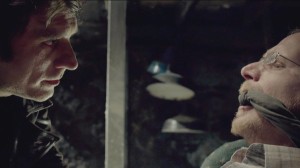Violent and graphic, Israeli horror-thriller, Big Bad Wolves isn’t a typical fairytale
Big Bad Wolves never really lives up to its opening scene, which serves as a beautiful introduction to a darkly tongue-in-cheek tale of revenge.
The camera follows three children, a boy and two girls, playing hide-and-seek in slow-motion. They run, first in a forest, then in what looks like an abandoned warehouse. The accompanying music seems to indicate that the game won’t end well. In fact, one of the girls decides to hide in a closet; the next time it is opened, all that’s left of her is one red shoe.

We learn that a child molester is at large, and that this is one of many recent kidnappings that have ended in murder. Someone sedates the children, abuses them, tortures them, beheads them and hides the heads so that their parents can’t even bury them in accordance with Jewish law, which requires corpses to be intact — nothing too uplifting.
The cop appointed to the case is Micki (Lior Ashkenazi), a sarcastic and unscrupulous man who doesn’t see a problem with resorting to violence when questioning the prime suspect, Dror (Rotem Keinan), who is a school teacher. He tries to beat a confession out of him, but fails. A boy wanders upon the scene and films the interrogation on his cellphone.
The boy then does what any modern kid would do — he uploads the footage on YouTube, and it predictably goes viral. Both men get in trouble with their superiors — Micki for being a bad cop, and Dror because being a suspected child murderer doesn’t do much to improve the school’s reputation. They end up getting suspended from their respective jobs.
But this is only the setup for the major storyline, which involves Gidi (Tzahi Grad), the father of the latest victim, going on a quest to reclaim his daughter’s head and get revenge on the murderer. He buys a house in the woods, tests it for being scream-proof, and kidnaps Dror for torture purposes. Micki also ends up there, because the plot requires it.
What we have here is a mix of grindhouse horror and black comedy. There are also elements of Jewish humour, like when Gidi keeps getting interrupted by phone calls and visits from his parents just as he’s about to take the next step in torturing his daughter’s alleged killer.
Oftentimes, you may find the humour inappropriate. The directors, Aharon Keshales and Navot Papushado, take a mostly light-hearted approach to very dramatic material. Is it really necessary for Micki to wisecrack when the headless, mutilated body of a child is found?
Some twists are clever, others are run-of-the-mill, but still, the movie manages to create suspense in a story that is not of the most original kind. What makes it work is the fairy-tale aspect of it. If you were unlucky enough to have read Grimm Brothers’ stories as a child — the original ones, not child-friendly versions — the feeling of dread evoked by this film will be familiar to you. Everything is stylized to appeal to the darkest corners of your imagination.
Big Bad Wolves is set in Israel, but it could be set anywhere, because where it really takes place is the movie universe. The story, characters and situations are not realistic, nor are they meant to be. How else to explain a Palestinian cowboy? The directors have borrowed cues from various sources and created an odd, stylish amalgam of genres and tones. No wonder it was praised by Tarantino himself.
Big Bad Wolves will be out on DVD and Blu-Ray on April 22.




